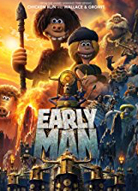Every Saturday this month, Tim will be taking a look at one of the films submitted for the Best Animated Feature Oscar.
 So as to avoid burying the lede, let me make it clear that Early Man is a pretty disposable little snip of a thing. One doesn't want to take anything made by Britain's Aardman Animations for granted: the financial state of stop-motion animation is none too strong, and it's a bit of a triumph anytime one of these features gets made and released. Nonetheless, by any standards, and particularly the very high bar Aaardman has set for itself with its beloved Wallace & Gromit shorts, Early Man is pretty low-key. The humor tends towards punny dad jokes, and the film never pretends to be anything else besides corny and silly fun.
So as to avoid burying the lede, let me make it clear that Early Man is a pretty disposable little snip of a thing. One doesn't want to take anything made by Britain's Aardman Animations for granted: the financial state of stop-motion animation is none too strong, and it's a bit of a triumph anytime one of these features gets made and released. Nonetheless, by any standards, and particularly the very high bar Aaardman has set for itself with its beloved Wallace & Gromit shorts, Early Man is pretty low-key. The humor tends towards punny dad jokes, and the film never pretends to be anything else besides corny and silly fun.
That being said, silliness isn't a problem in and of itself. And what we get in Early Man is more adorable than anything else...
It has the bright energy of a film that has pursued a goofy, even dumb concept all the way to completion, with no apparent effort. That concept being: what if cavemen played soccer? What if the invention, by cavemen, of soccer was the founding event from which all the rest of human civilization derived? And what if this all happened in the patch of primordial Europe that would one day become Manchester, thus providing the film with a title that turns out to be one of the most groaning of all its puns?

The actual plot that follows from this scenario is a perfectly straightforward underdog sports drama. The caveman tribe that first invented the game has, over many generations, forgotten all about it, but it's about to be rediscovered by the earnest and immeasurably dumb Dug (Eddie Redmayne), who ends up the first member of his tribe to leave their forest in a large, ancient crater, when a Bronze Age society led by the cruel Lord Nooth (Tom Hiddleston) comes along to eradicate the Stone Agers. Dug manages to convince Nooth to leave the tribe alone, if they beat Nooth's team of soccer champions. I truly hope you can imagine where it goes from there.
The whole thing is cheerfully daft, set in a plasticine universe perched between prehistoric Europe and ancient Babylon, populated by modern English, French, and German stereotypes. Screenwriters Mark Burton and James Higginson have not gone out of the way to make things hard on themselves, and it's probably not necessary that they did so: this is all a fairly easygoing lark, more interested in play than wit or cleverness. Director Nick Park, making his first film since 2005's Oscar-winning Wallace & Gromit in The Curse of the Were-Rabbit is no stranger to this kind of cinematic playtime: his early films are all full of busy sets and staging primarily meant to showcase the ingenuity and creativity of his and his animators' technique.

Early Man is absolutely no exception to this. Like every great Aardman film, it's full of gentle, tactile objects, looking like something that tumbled out of a toybox and was set upon by a creative child with a particularly absurd sense of humor. The warm, handicrafted sensibility of the sets and puppets thrive in the presence of the film's cornball jokes and provincialism around English football, for they all come from the same place of extreme, unrestrained enthusiasm. This is a film made by people who obviously cared deeply about making it, no matter how silly and trivial the content might be. That expresses itself in the sheer commitment to those goofy jokes; it also expresses itself in the lovingly fussed-over detail of the film's world.
In fact, this is maybe the most enjoyably-designed Aardman film yet made. While most of the studio's previous films have a distinctly homey, nostalgic Britishness to them, Matt Perry's production design shows off the most overtly fanciful sets they have built, particularly in the garish Bronze Age city, an irreverent marriage of numerous ancient world cultural references mixed up with some fine, awful puns. And the sets are only the most visible manifestation of a film in love with its own technique and models: the adorable Aardman rabbits, lovingly-detailed giant carnivorous ducks, and squishy facial expressions are as much about showing off the soft tactility of the studio's style as they are about doing anything else.
The result might not be particularly impressive, and it's even less surprising, but there's something sweet and pleasant about it. It's not the kind of imaginative triumph that Aardman made its reputation with, but it's still more personable than most of the corporate animation that gets released, and while an Oscar nomination would be an awfully generous way of rewarding that personality, it would be hard to begrudge that kind of recognition to something this contentedly nice and happy.
